Preservation of goods
MIL-D-3464E Clay Desiccant Bags – Optimal Protection Of Goods
What Is Clay Desiccant?
Clay desiccant, also known as clay desiccant, is a natural desiccant made from the mineral montmorillonite (bentonite clay). Montmorillonite is a rich volcanic clay mineral composed primarily of calcium, magnesium, and aluminum silicates. After mining, montmorillonite clay is processed by drying and activating (chemical or heat treatment) to increase its surface area and porosity.
The resulting clay particles are highly effective at absorbing and binding moisture due to their porous structure and large internal surface area. Clay desiccant packets are packaged in kraft paper, non-woven fabric, or Tyvek film, which keeps the desiccant inside while allowing moisture to pass through. These bags do not contain corrosive additives or toxic chemicals, making them safe and environmentally friendly.
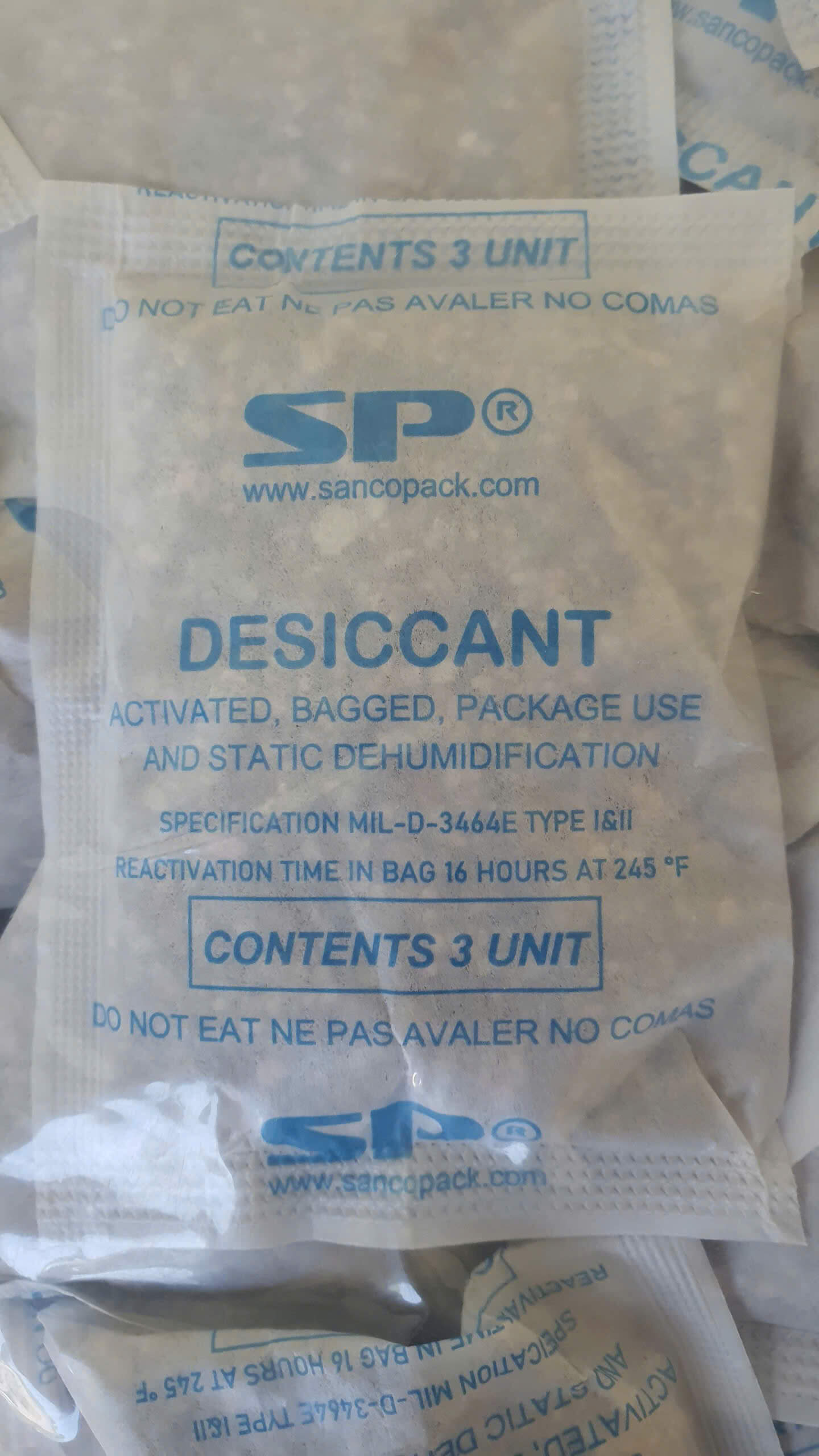
>>> See More : Reputable and Quality Super Dry Desiccant Supplier in Ho Chi Minh City
What Is MIL-D-3464E Standard and Why Is It Important?
MIL-D-3464E is the US military specification for desiccants in sachets used in the packaging and storage of goods. This standard describes in detail the requirements for the water absorption capacity of each “unit” of desiccant as well as how to test its quality. According to MIL-D-3464E, a unit of desiccant must be able to absorb at least 3 grams of water vapor at 20% relative humidity and at least 6 grams at 40% relative humidity (at 25°C).
In particular, MIL-D-3464E clearly specifies the absorbency, weight, absorption rate, and performance evaluation requirements of desiccants under standard test conditions to ensure effectiveness. Accordingly, desiccants that meet MIL-D-3464E standards will help prevent corrosion and mold by absorbing and retaining water in the air. This standard is important because it ensures that desiccant products have stable and reliable performance, suitable for demanding applications such as military, aviation, electronics and pharmaceuticals.
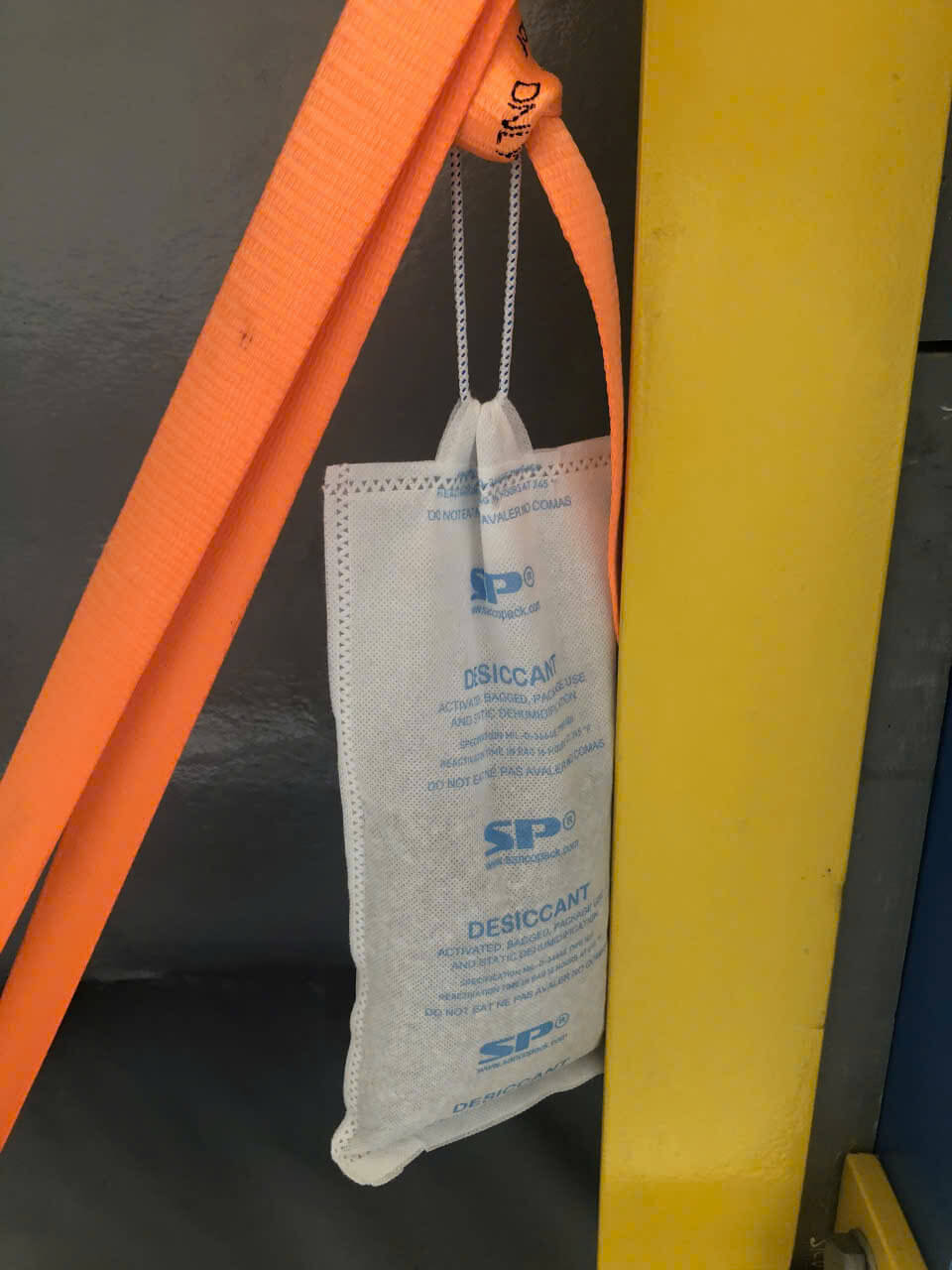
Benefits of Using Clay Desiccant Packets According to MIL-D-3464E Standard
Using MIL-D-3464E standard clay desiccant packs brings many benefits to both manufacturers and consumers:
- Product protection effect: Clay desiccant packets are capable of preventing mold growth and metal corrosion by effectively absorbing moisture in a sealed container. Due to the formula according to MIL-D-3464E, each clay packet has a quantitative moisture absorption capacity (at least 3g at 20% RH), which will reliably protect sensitive electronic components, mechanical equipment or pharmaceuticals.
- Safe and environmentally friendly: Clay desiccants are completely natural, containing no toxic or corrosive chemicals. They are inorganic, chemically inert and odorless absorbents. This makes them safe to use in food, pharmaceutical or electronic packaging without worrying about harmful chemical reactions. Furthermore, clay is a renewable and biodegradable material, minimizing environmental impact. MIL-D-3464E clay desiccant packets can often be regenerated by drying for reuse while maintaining their original properties.
- Reasonable cost: Compared to many other types of desiccants, bentonite clay has a lower cost but still achieves stable desiccant efficiency under normal temperature conditions. Manufacturers often pack many desiccant units in one bag to meet MIL standards, helping to optimize costs for customers.
- Stable performance: Clay desiccants perform well under normal room temperature and relative humidity conditions. Many studies have shown that bentonite has high absorption efficiency even at low humidity and increases as humidity increases. This property makes it suitable for keeping products dry in a variety of climatic conditions.
Applications of Clay Desiccant Packets in Industry
Thanks to the above features, MIL-D-3464E standard clay desiccant is widely used in many fields:
- Electronics and technology components: In boxes containing electronic devices, microchip components, mobile phones, computers, etc., desiccant packets help prevent moisture from entering the circuit board, reducing the risk of short circuits due to condensation. They are especially useful when transporting or storing high-end electronics for long periods of time.
- Food and pharmaceuticals: For dry goods (rice, grains, pills, packaged foods), clay desiccant packets keep the humidity inside the package at a safe level, prevent mold and extend shelf life. Absolutely safe thanks to natural ingredients, clay desiccant packets are licensed for use in food and pharmaceutical packaging without worrying about affecting health.
- Medical and pharmaceutical: Medical equipment components, drugs, and vaccines need to be stored in dry conditions, so MIL standard clay desiccant packets help maintain a dry environment, ensuring product effectiveness.
- Industrial and shipping goods: Desiccant packets are also commonly used in the packaging of mechanical components, auto parts, optical instruments, industrial machinery when exporting by sea, road or air. In containers or wet warehouses, using MIL-D-3464E standard industrial clay desiccant packets helps reduce the risk of environmental wear and tear.
Overall, MIL-D-3464E clay desiccant packets are an effective, safe solution for all moisture-sensitive perishable goods, from consumer to heavy industrial and military.
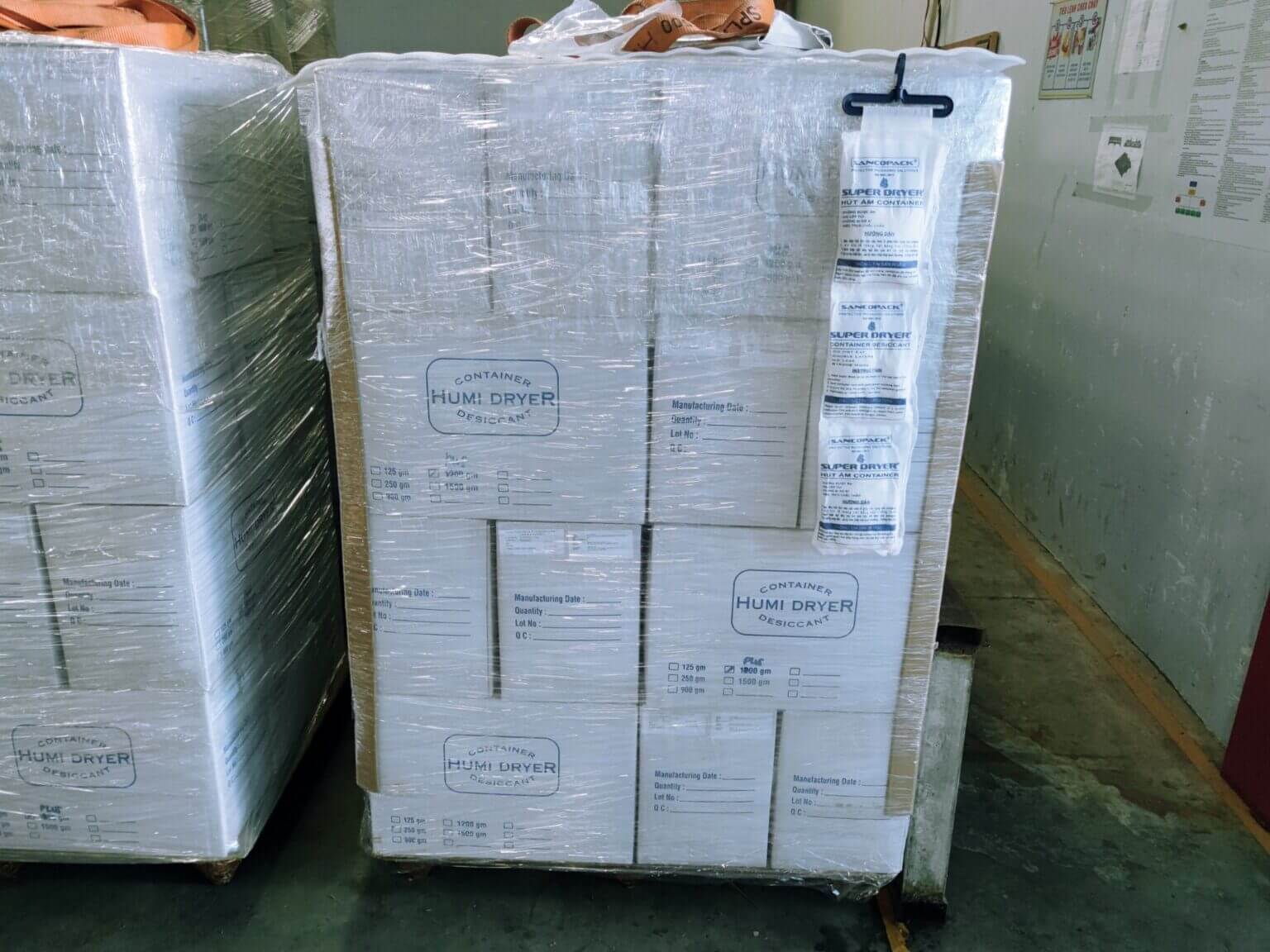
Compare Clay Desiccant Packets With Other Desiccants
- Silica gel: The most common type of adsorbent, with a structure of countless small pores, can absorb about 30–40% of its weight in water. Silica gel has a very fast rate of moisture absorption (only a few hours to 1–3 days) but the saturation cycle is also short. It works best in the temperature range of 15°C to 30°C, but if the temperature is higher, the absorbed moisture will be released back into the environment. Compared to silica gel, clay has a moderate water capacity (about 28% by weight at 80% RH) and a fast rate of moisture absorption (saturation in 1–3 days) but is more stable at room temperature and average humidity. Clay is less effective if the temperature is above 50°C, at which point it can release moisture.
- Calcium chloride (CaCl₂): This is an excellent salt, able to absorb a huge amount of moisture – up to 300% of the package weight in the range of 0–90°C. However, when absorbing moisture, CaCl₂ will dissolve into a salt solution – hindering transportation and even causing corrosion if leaked. Although extremely effective in very high humidity environments (such as shipping containers), CaCl₂ is not generally used for food/pharmaceutical packaging due to its corrosiveness and ability to leach moisture. Clay absorbs less than CaCl₂ (only about 28–30% by weight), but in return it is safer, dries freely and does not turn into a liquid.
- Molecular sieves (Zeolites): Have excellent moisture absorption at low steam concentrations and can withstand high temperatures. Zeolites are generally more expensive but offer high performance, especially under harsh conditions. Bentonite clays have the advantage of being cheap and having a wider range of uses (industrial, consumer).
- Other types (calcium oxide, calcium sulfate…): Calcium oxide (CaO) has a very high moisture absorption capacity but forms wet lime, which is a fire hazard. Calcium sulfate (CaSO₄) (alum) has an average moisture absorption and is used in moderate humidity conditions. Compared to them, clay packets absorb moderately but are much safer.
In summary, clay desiccant bag MIL-D-3464E provides a balanced solution between efficiency, safety and cost. It absorbs well under normal conditions, has low risk of hazardous chemicals and can be reused, while other types such as silica gel or zeolite have their own uses but are more expensive, and CaCl₂ is strong but has limited risk.
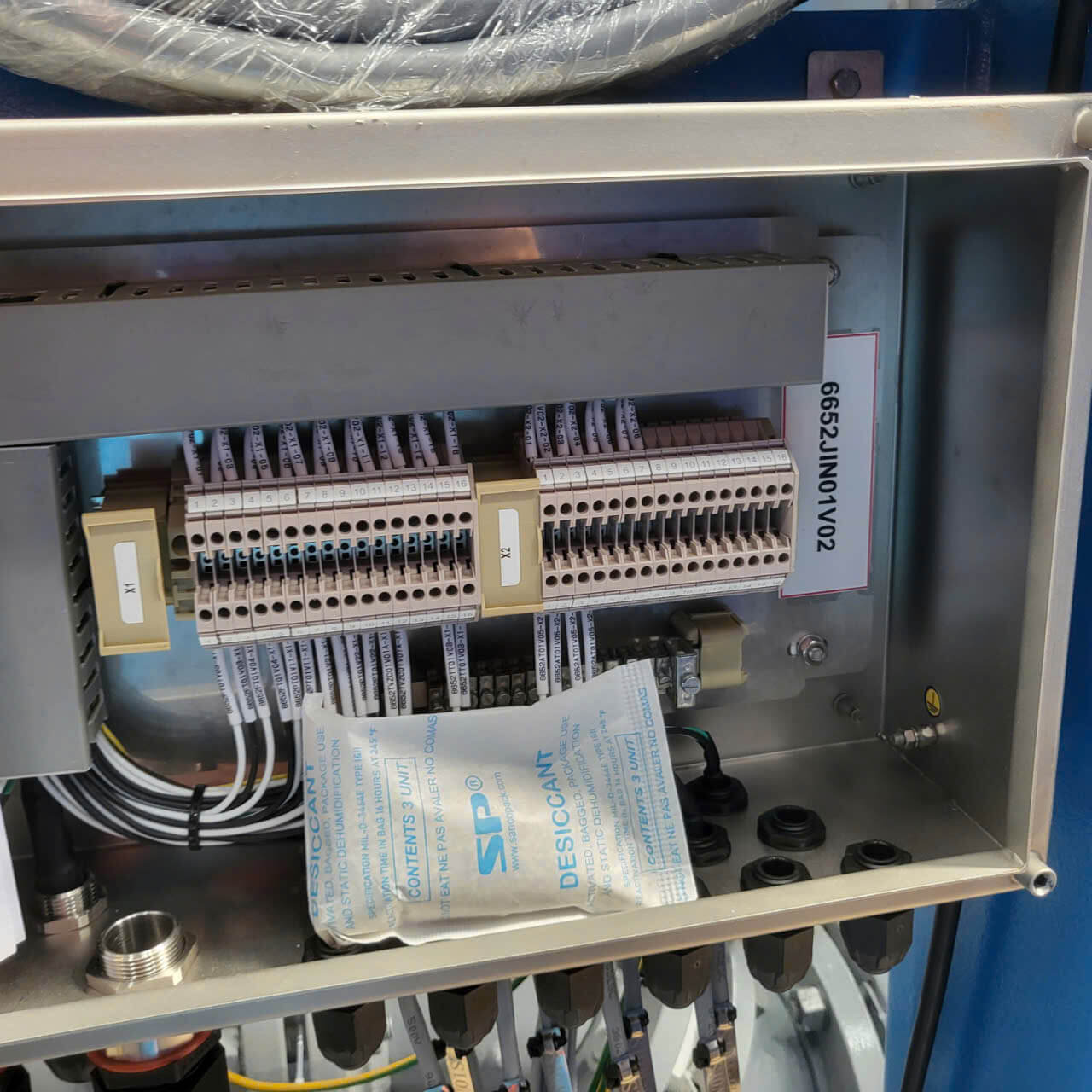
Notes When Choosing and Using Clay Desiccant Packets
When purchasing and using clay desiccant packages that meet MIL-D-3464E standards, businesses and consumers need to pay attention to the following points:
- Check the label and standards: Choose a product that clearly states it complies with MIL-D-3464E (military standard) to ensure quality and performance. The number of units on the label should be clear. For example, MIL defines one unit of moisture absorption as approximately 3g at 20% RH (25°C), so the number of units listed on the bag should match the number on the packaging.
- Suitable for temperature conditions: Clay desiccants work well at temperatures below ~50°C. If the storage environment is at a higher temperature, the desiccant effect will decrease (or even the desiccant will release). Therefore, when packing goods in hot environments (such as tropical shipping containers), consider adding other solutions or controlling the temperature.
- Quantity and placement: The amount of desiccant packets needed depends on the volume and dryness of the container. According to MIL-D-3464E, there is a formula for estimating the number of units needed based on the surface area of the packaging. Manufacturers often recommend a specific packet/box ratio; users need to follow this to ensure there is no shortage (leading to mold) or excess (wasting money). Desiccant packets should be placed on the top or spread out evenly, avoiding direct contact with the product (if possible, dust can enter).
- Safe to use: Although clay is non-toxic, children and pets should still be kept away from the desiccant (although it is not toxic when swallowed like silica gel which can cause choking). Pack tightly and do not let the package tear, to avoid clay dust escaping. For food packaging, choose desiccant bags with food safety certification.
- Storage and reuse: Clay desiccant packets should be stored in a dry place, away from moisture, when not in use. If the packet is saturated with moisture, it can be regenerated (dried at ~110°C for a period of time) for reuse. However, pay attention to the drying time and temperature limit to avoid damaging the packet. The shelf life of clay packets is usually 2–3 years if stored properly.
Complying with the above notes will help the MIL-D-3464E clay desiccant pack maximize its effectiveness, ensuring safety for goods and users.
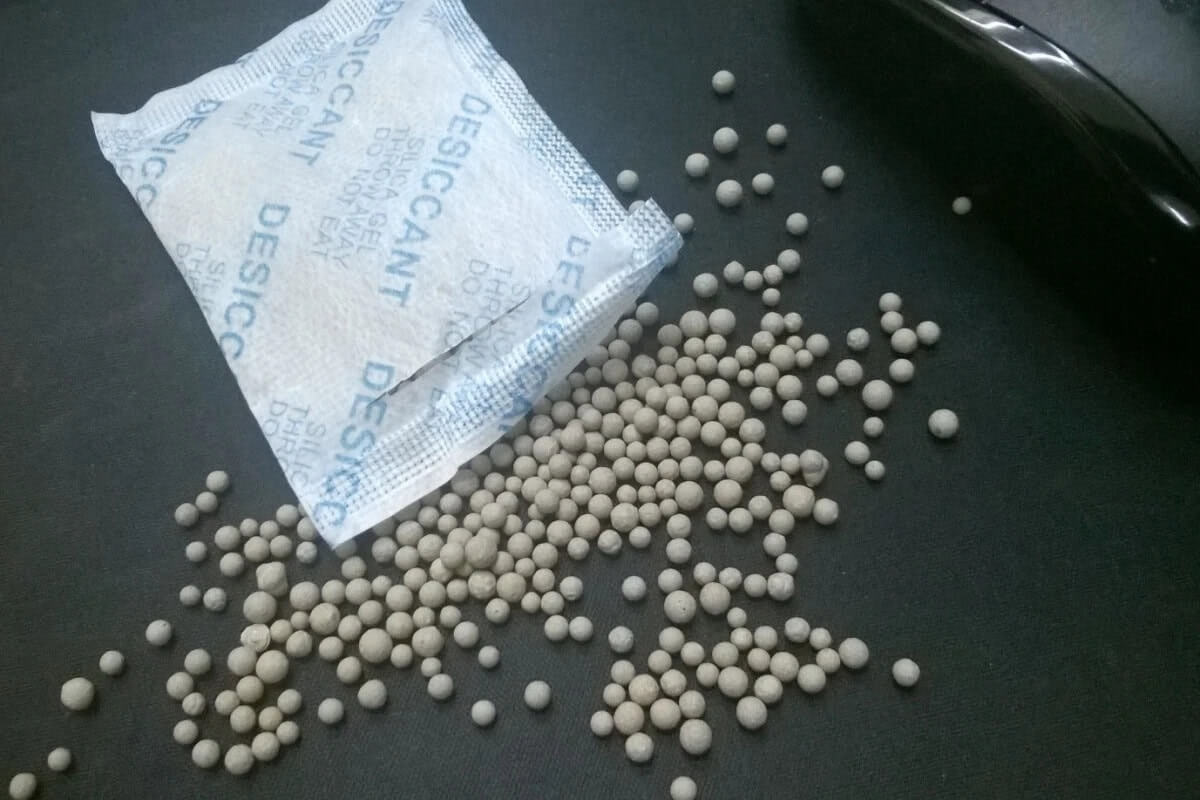
Sancopack – A Prestigious and Quality Supplier of Clay Desiccant Packets According to MIL-D-3464E Standards in Vietnam
Sancopack is the leading distributor in Vietnam providing clay desiccant packages that meet MIL-D-3464E standards, meeting the strict requirements for moisture absorption of the US Department of Defense. Products are imported from reputable international manufacturers, with full ISO certification and food safety standards, and are environmentally friendly.
With a variety of types from 1/16 units to 16 units, Sancopack helps effectively protect electronic components, pharmaceuticals, food and exported goods from mold, moisture, and corrosion during storage and transportation. Contact Sancopack immediately via Hotline: 0908105115 to receive the earliest advice and quotation!


